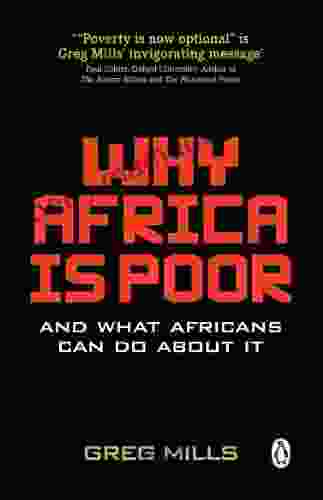Unveiling the Tangled Roots of Africa's Poverty: A Comprehensive Analysis

A Continent of Contradictions
Africa, the second-largest continent, is a land of immense beauty, cultural diversity, and natural resources. Yet, it also bears the burden of widespread poverty, with vast disparities in wealth and income distribution.
Despite its vast mineral wealth, fertile lands, and thriving human capital, Africa remains the poorest continent, with nearly half of its population living below the poverty line. This persistent economic malaise has perplexed policymakers, economists, and social activists for decades, prompting countless studies and debates.
4.2 out of 5
| Language | : | English |
| File size | : | 4662 KB |
| Text-to-Speech | : | Enabled |
| Screen Reader | : | Supported |
| Enhanced typesetting | : | Enabled |
| Word Wise | : | Enabled |
| Print length | : | 540 pages |
Historical Legacies: The Scars of Colonialism
The roots of Africa's poverty can be traced back to the era of colonialism, when European powers carved up the continent, imposing their rule and exploiting its resources. Colonial policies, such as forced labor, land confiscation, and the suppression of indigenous industries, had devastating long-term consequences.
Colonialism disrupted traditional economic systems, fostered dependency on foreign powers, and created deep-rooted inequalities. The arbitrary borders drawn by colonial powers often divided ethnic and linguistic groups, setting the stage for future conflicts and political instability.
Political Instability and Weak Governance
Political instability and weak governance have further exacerbated Africa's poverty. Many African countries have experienced civil wars, coups, and authoritarian rule, creating an environment that is hostile to investment and economic growth.
Corruption, nepotism, and a lack of accountability have also undermined the legitimacy of governments and hindered the effective allocation of resources. Weak institutions and poor infrastructure have limited access to essential services, such as education, healthcare, and transportation, perpetuating poverty and inequality.
The Impact of Globalization
Globalization, while offering opportunities for economic growth, has also presented challenges to African countries. Unfair trade policies, volatile commodity prices, and the influx of imported goods have undermined local industries and made it difficult for African countries to compete in the global market.
The liberalization of markets, often under the pressure of international financial institutions, has led to the displacement of small-scale farmers and businesses, further exacerbating poverty and inequality. Moreover, the global financial system has often worked to the detriment of African countries, making them vulnerable to external shocks and debt crises.
External Debt and Aid Dependence
Many African countries are burdened by high levels of external debt, a legacy of colonial exploitation and misguided economic policies. Debt servicing consumes a significant portion of government budgets, diverting funds away from essential social programs.
Aid dependence has also created a dependency culture, eroding the capacity of African countries to address their own economic problems. Aid often comes with conditions that may not align with local priorities and can undermine national sovereignty.
Education and Skills Gap
Education levels in Africa remain low, with high rates of illiteracy and a shortage of skilled workers. Limited access to quality education limits employment opportunities and perpetuates poverty. Traditional educational systems may not be equipped to meet the demands of the modern economy, further hindering economic growth.
Environmental Challenges
Environmental degradation, climate change, and natural disasters also contribute to Africa's poverty. Droughts, floods, and other natural disasters disproportionately affect the poor, who rely heavily on natural resources for their livelihoods. Environmental degradation, such as deforestation and soil erosion, further undermines agricultural productivity and economic growth.
Breaking the Cycle of Poverty
Addressing the complex web of factors that contribute to Africa's poverty requires a multi-pronged approach. Some key strategies include:
- Promoting good governance: Strengthening democratic institutions, combating corruption, and ensuring accountability are essential for creating a stable environment for investment and economic growth.
- Investing in infrastructure: Developing roads, ports, railways, and other infrastructure is crucial for connecting markets, facilitating trade, and enhancing access to essential services.
- Supporting education and skills development: Expanding access to quality education and vocational training will provide African youth with the knowledge and skills they need to compete in the global economy.
- Diversifying economies: Reducing reliance on a single commodity or sector will help African countries weather economic shocks and create more resilient economies.
- Addressing external debt: Restructuring or forgiving external debt will free up resources for investment in social programs and economic growth.
- Reforming international trade policies: Establishing more equitable trade policies and reducing barriers to African exports will enable African countries to participate more fully in the global economy.
- Promoting sustainable development: Addressing environmental challenges and promoting sustainable practices will help protect livelihoods and ensure future economic growth.
Africa's poverty is a multifaceted problem with deep historical roots and complex contemporary challenges. Tackling this issue requires a concerted effort from African governments, international organizations, and civil society. By addressing the underlying causes of poverty and implementing sustainable solutions, Africa can break the cycle of poverty and unleash its full potential.
Unlocking the economic potential of Africa will not only benefit the continent but will also have positive ripple effects on the global economy. A prosperous and stable Africa will be a partner for sustainable development and a force for peace and progress.
4.2 out of 5
| Language | : | English |
| File size | : | 4662 KB |
| Text-to-Speech | : | Enabled |
| Screen Reader | : | Supported |
| Enhanced typesetting | : | Enabled |
| Word Wise | : | Enabled |
| Print length | : | 540 pages |
Do you want to contribute by writing guest posts on this blog?
Please contact us and send us a resume of previous articles that you have written.
 Top Book
Top Book Novel
Novel Fiction
Fiction Nonfiction
Nonfiction Literature
Literature Paperback
Paperback Hardcover
Hardcover E-book
E-book Audiobook
Audiobook Bestseller
Bestseller Classic
Classic Mystery
Mystery Thriller
Thriller Romance
Romance Fantasy
Fantasy Science Fiction
Science Fiction Biography
Biography Memoir
Memoir Autobiography
Autobiography Poetry
Poetry Drama
Drama Historical Fiction
Historical Fiction Self-help
Self-help Young Adult
Young Adult Childrens Books
Childrens Books Graphic Novel
Graphic Novel Anthology
Anthology Series
Series Encyclopedia
Encyclopedia Reference
Reference Guidebook
Guidebook Textbook
Textbook Workbook
Workbook Journal
Journal Diary
Diary Manuscript
Manuscript Folio
Folio Pulp Fiction
Pulp Fiction Short Stories
Short Stories Fairy Tales
Fairy Tales Fables
Fables Mythology
Mythology Philosophy
Philosophy Religion
Religion Spirituality
Spirituality Essays
Essays Critique
Critique Commentary
Commentary Glossary
Glossary Bibliography
Bibliography Index
Index Table of Contents
Table of Contents Preface
Preface Introduction
Introduction Foreword
Foreword Afterword
Afterword Appendices
Appendices Annotations
Annotations Footnotes
Footnotes Epilogue
Epilogue Prologue
Prologue Heather Hildenbrand
Heather Hildenbrand Ava Benton
Ava Benton Stephanie L Mcandrews
Stephanie L Mcandrews C P Gause
C P Gause Monique Orgeron
Monique Orgeron Katherine Watson
Katherine Watson Douglas P Mccormick
Douglas P Mccormick Ananish Chaudhuri
Ananish Chaudhuri William Strauss
William Strauss Susan Ragsdale
Susan Ragsdale Thema Azize Serwa
Thema Azize Serwa Veronia Wilson
Veronia Wilson Justina Wheelock
Justina Wheelock Bruce Bond
Bruce Bond Ian Probert
Ian Probert Vivian Stuart
Vivian Stuart Tom Conklin
Tom Conklin Kathryn Lukas
Kathryn Lukas Andrea Carter
Andrea Carter Don Marquis
Don Marquis
Light bulbAdvertise smarter! Our strategic ad space ensures maximum exposure. Reserve your spot today!

 Haruki MurakamiJanice VanCleave's Big Book of Science Experiments: An Exploration of Science...
Haruki MurakamiJanice VanCleave's Big Book of Science Experiments: An Exploration of Science... Elmer PowellFollow ·6.5k
Elmer PowellFollow ·6.5k Paul ReedFollow ·10.1k
Paul ReedFollow ·10.1k Patrick HayesFollow ·7.2k
Patrick HayesFollow ·7.2k Jimmy ButlerFollow ·9.8k
Jimmy ButlerFollow ·9.8k Clark BellFollow ·6k
Clark BellFollow ·6k DeShawn PowellFollow ·11.4k
DeShawn PowellFollow ·11.4k Fred FosterFollow ·14.7k
Fred FosterFollow ·14.7k Samuel Taylor ColeridgeFollow ·19.4k
Samuel Taylor ColeridgeFollow ·19.4k

 Patrick Hayes
Patrick HayesDeath on Stage: Euphemia Martins Mystery 16
Synopsis In the...

 Benji Powell
Benji Powell1001 Best Baking Recipes Of All Time
Baking is a fun and...

 Terry Bell
Terry BellDestined War of the Covens: A Supernatural Saga of Power,...
Welcome to the...

 Mark Twain
Mark TwainBitcoin For Mere Mortals: A Comprehensive Guide for...
Bitcoin is a...

 Dennis Hayes
Dennis HayesThe Best Budget Gaming PC 2024: Build the Ultimate Gaming...
Are you looking to build the best budget...
4.2 out of 5
| Language | : | English |
| File size | : | 4662 KB |
| Text-to-Speech | : | Enabled |
| Screen Reader | : | Supported |
| Enhanced typesetting | : | Enabled |
| Word Wise | : | Enabled |
| Print length | : | 540 pages |












